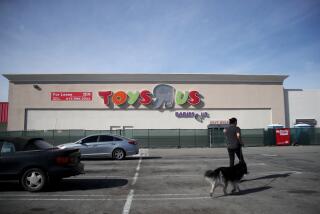Panel Alleges ‘Massive Fraud’ Committed by Ex-MiniScribe Officials
- Share via
NEW YORK — The former managers of computer disk-drive maker MiniScribe Corp. allegedly “perpetrated a massive fraud” by masking the company’s declining fortunes with elaborately faked financial statements, an independent panel charged Tuesday.
The panel, made up of newly elected directors and auditors, described unusual schemes to boost sales and inventory as the business fell on hard times.
In one instance, the company shipped bricks to distributors and marked them down as computer component sales. In another, repackaged scrap metal and obsolete parts were made to appear to be new products.
“The fraud was all the more alarming in that it required the active participation of many company personnel, and was apparently common knowledge among a great many other employees,” said the panel, which submitted its study of the business practices of Longmont, Colo.-based MiniScribe to the Securities and Exchange Commission.
The victims were “the company, its directors, its outside auditors and the investing public,” the panel said. The report concluded that MiniScribe’s operating results were manipulated to boost profits.
In a statement accompanying the report, the company’s new management said previously reported earnings for 1986 through 1988 will be “materially and adversely affected” when accurate results are compiled.
Former MiniScribe Chairman Q. T. Wiles resigned in February, and several top officials were dismissed after the company announced a fourth-quarter 1988 loss of $14.6 million and a drop in annual profits to $25.8 million from $31.1 million despite what it had claimed was a 66% gain in sales to $362.5 million.
Reorganized Firm
Wiles, formerly the chairman of venture capital firm Hambrecht & Quist and a respected corporate turnaround specialist, took command at MiniScribe in 1985. The company had just lost its biggest customer, International Business Machines Corp., and the personal computer industry was weak.
Wiles sharply reduced the work force and reorganized the company, creating separate divisions, each with its own incentives and sales quotas.
“MiniScribe’s management environment created and maintained an exceptional amount of pressure on company managers to achieve pre-established quarterly profitability goals,” the report said.
“For division managers, the most important task was, invariably, to ‘make the numbers,’ ” it said.
Attempts to reach Wiles by telephone at his home in Sherman Oaks were unsuccessful.
The report said MiniScribe’s accounting and internal auditing function was “organized to prevent its ‘interference’ with the company’s business operations.” This put its financial control function “in the operating divisions, where it resided in the hands of individuals who did not necessarily have financial training.”
The report said liberal use of incentive payments “provided, to those willing to engage in fraudulent activities, both the incentive and the means to do so.”
Practices Listed
The report described the following irregular practices:
- Following completion of the year-end 1986 physical inventory, the company discovered a shortage valued at $4 million to $6 million. The shortfall was concealed by senior managers.
- Company officials apparently broke into locked trunks containing the auditors’ work papers during the 1986 year-end audit and changed inventory figures.
- MiniScribe generated $3.66 million of false inventory values by packaging bricks and shipping them in 1987 to distributors as disk drives, posting $4.3 million in sales. When the shipments were returned, it increased its inventory by the purported cost of the items shipped, or $3.66 million.
- Obsolete parts were shipped to Singapore and Hong Kong and, with scrap and other parts at those locations, were repackaged or relabeled as active parts and then included in the 1987 inventory at a value of $8.9 million.
- Throughout 1988, the accumulated scrap that had been written off was included in inventory at full value. Obsolete parts and scrap from the 1987 inventory were also carried on 1988 books and valued at $3.5 million.
- During the 1988 fourth quarter, 6,100 disk drives were found to be contaminated. The drives were counted during the physical inventory and included in inventory at full value.
The report also said that in 1988, the company dramatically increased shipments to three warehouses, booking $56.4 million in sales and a gross profit of $5.4 million. According to the investigators, none of these sales should have been reported in 1988.
Chief Financial Officer Roger J. Mason said MiniScribe hopes to complete a restatement of financial results for 1986, 1987 and 1988 within six to eight weeks. A July 2, 1989, balance sheet also is being worked on and is expected to show a very substantial negative net worth.






